Research on health services and systems in New Zealand, and beyond, is a major strength in the Division of Health Sciences at the University of Otago.
Visit the listings of our research groups below, or check out our featured projects.
Featured research projects
The Burden of Disease Epidemiology, Equity and Cost-Effectiveness Programme (BODE3)
 The Burden of Disease Epidemiology, Equity and Cost-Effectiveness Programme (BODE³) was a Health Research Council funded research programme. It has studied the health and wider societal gains, costs, cost-effectiveness and equity impacts of health sector interventions, and has built capacity in modelling of health sector interventions.
The Burden of Disease Epidemiology, Equity and Cost-Effectiveness Programme (BODE³) was a Health Research Council funded research programme. It has studied the health and wider societal gains, costs, cost-effectiveness and equity impacts of health sector interventions, and has built capacity in modelling of health sector interventions.
Health Research Council funding for the BODE3 Programme officially finished in January 2022. This programme of research has produced important evidence on the health impacts and cost effectiveness of a range of policies and interventions for Aotearoa New Zealand. It has also supported many staff in developing skills in the field of epidemiological/health economic modelling. Going forward, there are a number of modelling research projects that will be continuing in the Department of Public Health and these projects will form a research network: SiHMNet: Simulation Health Modelling Network. Additional work that builds on BODE³ tobacco modelling is being led by the University of Melbourne.
Email bode3@otago.ac.nz
Web otago.ac.nz/wellington/publichealth/research/bode3
Cancer and Chronic Conditions (C3) research group
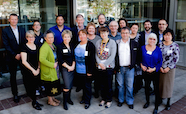 The Cancer and Chronic Conditions (C3) research group is a collaborative group of researchers working at the interface between public health, health services research, and clinical medicine. Our work includes a range of projects aimed at reducing the impact of cancer and chronic conditions on population health and health inequalities through policy and health system change.
The Cancer and Chronic Conditions (C3) research group is a collaborative group of researchers working at the interface between public health, health services research, and clinical medicine. Our work includes a range of projects aimed at reducing the impact of cancer and chronic conditions on population health and health inequalities through policy and health system change.
Ko te rōpū rangahau mō te Mate Pukupuku me ngā Māuiui Tūroa (C3), he kāhui kairangahau e mahi tahi ana ki waenga i ngā ao o te rāngai hauroa tūmatanui, te rangahau ratonga hauora me te rongoā haumanu. Kei te kōkiri mātau i ētahi kaupapa e mahi ana ki te whakaiti i te pānga o te mate pukupuku me ngā māuiui tūroa ki te hauora o te taupori me ngā ōritenga kore o te hauora mā te whakarerekē i ngā kaupapahere me te pūnaha hauora.
Email jason.gurney@otago.ac.nz
Web otago.ac.nz/wellington/publichealth/research/cancercontrol
Centre for Health Systems and Technology
 The Centre for Health Systems and Technology (CHeST) has a particular focus on the applied end of health system and technology research, supporting the translation of research into practice.
The Centre for Health Systems and Technology (CHeST) has a particular focus on the applied end of health system and technology research, supporting the translation of research into practice.
CHeST's five core themes:
- Health Care Delivery
- Health System Architecture, Management, and Performance
- Health Quality, Safety, and Community Engagement
- Health Workforce
- Health Technology
Email chest@otago.ac.nz
Web otago.ac.nz/healthsystems
Centre for International Health
The Centre for International Health facilitates and promotes research to contribute to the understanding and improvement of health in under-resourced countries, and focuses on postgraduate training and strategic mentorship of leaders.
Email internationalhealth@otago.ac.nz
Web otago.ac.nz/internationalhealth
Centre for Pacific Health (Va'a o Tautai)
 The Va'a o Tautai – Centre for Pacific Health is home to a dedicated team of Pacific and non-Pacific researchers working in areas of importance to Pacific communities in New Zealand and internationally.
The Va'a o Tautai – Centre for Pacific Health is home to a dedicated team of Pacific and non-Pacific researchers working in areas of importance to Pacific communities in New Zealand and internationally.
Pacific health is a holistic concept that encompasses broader ideas on well-being to encompass physical, mental, and spiritual aspects. With more than 20 different cultures captured under the umbrella of 'Pacific', there are unique approaches to health that mean health care, health systems and health services can be enriched with further understanding of Pacific-specific approaches to health.
Email vot@otago.ac.nz
Web otago.ac.nz/healthsciences/pacific/vaa-o-tautai
Christchurch Heart Institute
 Here at the Christchurch Heart Institute we help save thousands of lives through research into improved diagnosis, better prediction and advanced treatments for heart disease. Our team of internationally-renowned experts directly play a role in increasing the survival of New Zealanders with heart disease.
Here at the Christchurch Heart Institute we help save thousands of lives through research into improved diagnosis, better prediction and advanced treatments for heart disease. Our team of internationally-renowned experts directly play a role in increasing the survival of New Zealanders with heart disease.
Our research focus:
- New blood tests for heart attack diagnosis and prognosis
- Using new methods for treating heart failure and improving outcomes
- Understanding the genetics of heart disease; why heart disease runs in some families
Email chi@otago.ac.nz
Web otago.ac.nz/chch-heart-institute
Community Pharmacy Demonstration Project
 A team based in Public Health has been contracted to conduct an evaluation of a recent demonstration site initiative being conducted in some community pharmacies in Canterbury. The goal of the new model operating in the demonstration pharmacies is to enable pharmacists to better utilise their extensive expertise in medicines management to support patients in the safe and effective use of medicines.
A team based in Public Health has been contracted to conduct an evaluation of a recent demonstration site initiative being conducted in some community pharmacies in Canterbury. The goal of the new model operating in the demonstration pharmacies is to enable pharmacists to better utilise their extensive expertise in medicines management to support patients in the safe and effective use of medicines.
Email publichealth.uoc@otago.ac.nz
Web otago.ac.nz/populationhealth/otago049052.html
D4 Network
 D4—Diagnostics, Drugs, Devices and Discovery focuses on translational research for improving care.
D4—Diagnostics, Drugs, Devices and Discovery focuses on translational research for improving care.
Research focus:
- Creating novel point-of-care diagnostics and devices enabling targeted and selective treatments
- Developing smart drug delivery systems and devices to improve and optimise therapy
- Drug discovery for innovative treatments
The network draws together the disciplines of bioengineering, pharmaceutical science and drug discovery with an emphasis on collaborating with commerce and industry.
Email greg.walker@otago.ac.nz
Web otago.ac.nz/d4
Healthier Lives – He Oranga Hauora National Science Challenge
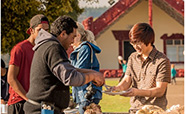 The Healthier Lives – He Oranga Hauora National Science Challenge is a national research collaboration dedicated to achieving healthier lives for all New Zealanders.
The Healthier Lives – He Oranga Hauora National Science Challenge is a national research collaboration dedicated to achieving healthier lives for all New Zealanders.
It undertakes collaborative research aimed at equitably improving the prevention and treatment of four major non-communicable diseases:
- Cancer
- Cardiovascular disease
- Diabetes
- Obesity
Our vision
He Oranga Hauora kitenga
Aotearoa hei whenua he ōrite ngā putanga hua hauora mō te tangata, kia iti iho hoki ngā pīkauranga o ngā māuiui kāore e taea te tuku ki te tangata kē.
Healthier Lives vision
New Zealand with equitable health outcomes and a substantially reduced burden of non-communicable diseases.
Many factors impact on the health of New Zealanders, including systems that affect the whole population, cultural factors that relate to particular communities, and the genetic make-up and life experiences of individuals.
Healthier Lives' research is therefore focussed within three themes:
- Healthy food and physical activity environments
- Culturally centred health interventions for Māori and Pacific peoples
- Precision medicine and personalised prevention
Email healthier.lives@otago.ac.nz
Web healthierlives.co.nz
Health Services Research at Otago
Identifying the most effective ways to organise, manage, finance, and deliver high quality health care
Health Services Research at Otago supports research excellence across all areas of health services delivery.
We bring unique strengths to our work:
- Leading research capability
- Special connectedness with health professionals' training
- Enduring relationships with health services agencies across New Zealand
Email healthservices.research@otago.ac.nz
Web otago.ac.nz/health-services
HIV: The lived experience
 This research is conducted within the Department of Population Health, University of Otago, Christchurch. It explores the intersections between the experience of living with HIV, aging and social isolation in Canterbury across time to inform planning for service delivery models.
This research is conducted within the Department of Population Health, University of Otago, Christchurch. It explores the intersections between the experience of living with HIV, aging and social isolation in Canterbury across time to inform planning for service delivery models.
Research suggests that people are living longer with HIV and therefore as a group are getting older; more people are being diagnosed with HIV later in life; and there has been a trend in geographical movement of people living with HIV/AIDS from cities to rural areas. These factors all have an impact on access to support and health services.
Email gillian.abel@otago.ac.nz
Web otago.ac.nz/populationhealth/otago045432.html
Hospital Healthcare Performance
 This project will adapt and apply new outcome measures and modern statistical approaches to evaluating hospital performance in New Zealand. As well as providing information on variability and trends in in-patient outcomes and hospital-level predictors of these outcomes, this project will provide the statistical basis for a sophisticated system for analysis and monitoring of hospital outcomes. A particular focus of this project is the identification of aspects of hospital organisation and working environment which may be related to patient outcomes.
This project will adapt and apply new outcome measures and modern statistical approaches to evaluating hospital performance in New Zealand. As well as providing information on variability and trends in in-patient outcomes and hospital-level predictors of these outcomes, this project will provide the statistical basis for a sophisticated system for analysis and monitoring of hospital outcomes. A particular focus of this project is the identification of aspects of hospital organisation and working environment which may be related to patient outcomes.
Email publichealth.uoc@otago.ac.nz
Web otago.ac.nz/populationhealth/otago010912.html
Mental Health Research at Otago
 Mental health is a broad and complex issue facing New Zealanders – and a research strength of the University of Otago. This website brings together our investigators and teams contributing to New Zealand's research achievement in the field of mental health.
Mental health is a broad and complex issue facing New Zealanders – and a research strength of the University of Otago. This website brings together our investigators and teams contributing to New Zealand's research achievement in the field of mental health.
Explore our mental health research:
- Alphabetical listing of our mental health research
- Māori and Pacific mental health
- Mental disorders
- Mental health risk factors
- Population mental health and health services
- Well-being
Web otago.ac.nz/mental-health-research
National Centre for Lifecourse Research (NCLR)
 The aim of the National Centre for Lifecourse Research is to build collaborations via research and policy translation nationally and internationally.
The aim of the National Centre for Lifecourse Research is to build collaborations via research and policy translation nationally and internationally.
The NCLR and partners have a long history of conducting world-leading lifecourse research.
Research fields:
- Research on human development aimed at informing policy and practice
- Intervention research: Assessing the impact of programmes and interventions on people's lives
Email moana.theodore@otago.ac.nz
Web otago.ac.nz/nclr
New Zealand National Poisons Centre
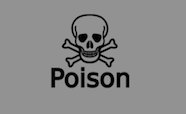 The New Zealand National Poisons Centre (NZNPC) answers enquiries both from health professionals and from the general public concerning acute poisoning and the toxic effects of chemicals, drugs, poisonous plants, poisonous insects and marine animals. The 24-hour telephone number is 0800 POISON (0800 764-766). The NPC also maintains an extensive database (TOXINZ) that contains information and treatment guidelines for the management of poisoned patients. The database contains some 200,000 listed chemical products, pharmaceuticals, plants and hazardous creatures. It has New Zealand specific trade names, household products, plant and animal species.
The New Zealand National Poisons Centre (NZNPC) answers enquiries both from health professionals and from the general public concerning acute poisoning and the toxic effects of chemicals, drugs, poisonous plants, poisonous insects and marine animals. The 24-hour telephone number is 0800 POISON (0800 764-766). The NPC also maintains an extensive database (TOXINZ) that contains information and treatment guidelines for the management of poisoned patients. The database contains some 200,000 listed chemical products, pharmaceuticals, plants and hazardous creatures. It has New Zealand specific trade names, household products, plant and animal species.
Email poisons@otago.ac.nz
Web poisons.co.nz
New Zealand Pharmacovigilance Centre
 The New Zealand Pharmacovigilance Centre (previously known as CARM) was established in 1965 for the purpose of monitoring adverse reactions occurring in patients to medicines marketed in New Zealand.
The New Zealand Pharmacovigilance Centre (previously known as CARM) was established in 1965 for the purpose of monitoring adverse reactions occurring in patients to medicines marketed in New Zealand.
Email nzphvc@otago.ac.nz
Web nzphvc.otago.ac.nz
Ngāi Tahu Māori Health Research Unit
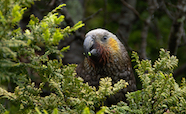 The Ngāi Tahu Māori Health Research Unit is a partnership between Te Runanga o Ngāi Tahu and the Dunedin School of Medicine of the University of Otago. The Unit collects, collates, interprets and publishes information, data and statistics on Māori health issues.
The Ngāi Tahu Māori Health Research Unit is a partnership between Te Runanga o Ngāi Tahu and the Dunedin School of Medicine of the University of Otago. The Unit collects, collates, interprets and publishes information, data and statistics on Māori health issues.
Email emma.wyeth@otago.ac.nz
Web otago.ac.nz/dsm/ngaitahu
Otago Global Health Institute (OGHI)
 We aim to improve global health and save lives, by identifying and evaluating solutions to important health problems in low-resource settings.
We aim to improve global health and save lives, by identifying and evaluating solutions to important health problems in low-resource settings.
We work to address the world's most pressing health problems through research collaborations with low- and middle-income countries, and with disadvantaged groups in New Zealand.
We draw upon New Zealand's unique connections with Asia and the Pacific. Our extensive international partnerships and cross-disciplinary collaborations enable us to carry out innovative and rigorous research to advance global health.
Email globalhealth@otago.ac.nz
Web otago.ac.nz/global-health
Pacific Health Research at Otago
 Talofa lava, kia orana, malo e lelei, fakaalofa lahi atu, bula vinaka, malo ni, halo ola keta, mauri, fakatalofa atu, and warm Pacific greetings!
Talofa lava, kia orana, malo e lelei, fakaalofa lahi atu, bula vinaka, malo ni, halo ola keta, mauri, fakatalofa atu, and warm Pacific greetings!
We're celebrating our Pacific health research in the Division of Health Sciences.
Learn about what's going on in Pacific health research, how we can support researchers, and where to start if you're excited about research.
Email vot@otago.ac.nz
Web otago.ac.nz/pacific-health-research
Prostitution Law Reform Study
 While sex work is no longer illegal, we have no idea if and how the Prostitution Reform Act (PRA) (2003) has informed social work practice with sex workers. We will explore the extent to which social workers are aware of the legal rights afforded to sex workers, and the extent to which young people under the age of 18 involved in sex work are affected by the legislation.
While sex work is no longer illegal, we have no idea if and how the Prostitution Reform Act (PRA) (2003) has informed social work practice with sex workers. We will explore the extent to which social workers are aware of the legal rights afforded to sex workers, and the extent to which young people under the age of 18 involved in sex work are affected by the legislation.
Email publichealth.uoc@otago.ac.nz
Web otago.ac.nz/populationhealth/otago041556.html
School of Pharmacy
 The School of Pharmacy has a very active research programme with disciplines ranging from science to humanities with each having a strong contextual link to health sciences.
The School of Pharmacy has a very active research programme with disciplines ranging from science to humanities with each having a strong contextual link to health sciences.
Research areas:
- Clinical Pharmacy: concerned with patient care and the optimisation of medicine use in order to promote health and wellness, and prevent disease.
- Pharmaceutical Sciences: drug discovery, drug metabolism and drug action to extend the range of drugs available and to provide a scientific basis for the quality use of medicines and bioactive substances.
Email pharmacy.research@otago.ac.nz
Web otago.ac.nz/pharmacy/research
Sir John Walsh Research Institute for Oral Health
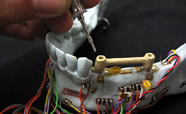 We advance research and increase knowledge for the improvement of oral health in New Zealand. Our research aims are to develop clinical research that translates discoveries into measurable health benefits, and to maintain fundamental research that underpins our teaching. From the molecular level through biological systems to the health of populations, our research is improving oral health in New Zealand.
We advance research and increase knowledge for the improvement of oral health in New Zealand. Our research aims are to develop clinical research that translates discoveries into measurable health benefits, and to maintain fundamental research that underpins our teaching. From the molecular level through biological systems to the health of populations, our research is improving oral health in New Zealand.
Email sjwri.admin@otago.ac.nz
Web otago.ac.nz/sjwri
Te Rōpū Rangahau Hauora A Eru Pōmare
 Te Rōpū Rangahau Hauora a Eru Pōmare strives to create a Kaupapa Māori space committed to improving Māori health outcomes and eliminating inequalities through quality science and ongoing theoretical development. It takes a rights-based approach consistent with the Treaty of Waitangi, and is engaged with community through a spectrum of influence from community development, policy advocacy, research dissemination and Māori health research workforce development.
Te Rōpū Rangahau Hauora a Eru Pōmare strives to create a Kaupapa Māori space committed to improving Māori health outcomes and eliminating inequalities through quality science and ongoing theoretical development. It takes a rights-based approach consistent with the Treaty of Waitangi, and is engaged with community through a spectrum of influence from community development, policy advocacy, research dissemination and Māori health research workforce development.
Email bridget.robson@otago.ac.nz
Web otago.ac.nz/wellington/publichealth/research/erupomare
Virtual Health Information Network
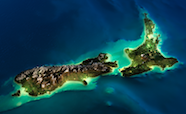 The Virtual Health Information Network (VHIN) supports high value and high quality research from linked data, frequently using the StatsNZ Integrated Data Infrastructure (IDI). The VHIN is a network of researchers, analysts and professionals who share and collaborate to use health and social data and generate insights to improve the health and well-being of all New Zealanders. The VHIN aims to build capacity and capability.
The Virtual Health Information Network (VHIN) supports high value and high quality research from linked data, frequently using the StatsNZ Integrated Data Infrastructure (IDI). The VHIN is a network of researchers, analysts and professionals who share and collaborate to use health and social data and generate insights to improve the health and well-being of all New Zealanders. The VHIN aims to build capacity and capability.
Resources:
- Guides
- Code sharing
- Courses
Email: vhin@otago.ac.nz
Web: vhin.co.nz
Featured research projects
Building partnerships... not silos

Better integration is one of the key issues facing health care globally, but the challenge is how to bring health professionals, researchers and the community together.
Big data for big problems

With the ability to link health, social and economic data, the Virtual Health Information Network is helping researchers and decision-makers gain maximum benefit from the information contained within New Zealand's big data assets.
Singapore Collaboration
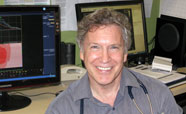
A well-established research connection between the Christchurch Heart Institute and the National University of Singapore is enabling innovative work with significant global implications, changing the way heart failure is viewed from one part of the world to another.
Global health

The Centre for International Health plays a significant role in projects in Africa, Asia and the Pacific, with partners from across the University and collaborators from around the globe, addressing some of the most pressing health issues facing the developing world.
Dynamic delivery

Estimating disease burden, cost-effectiveness and equity impacts of health sector interventions.
Connecting the dots
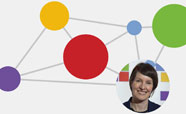
Dr Suetonia Palmer is sorting the wheat from the chaff.

